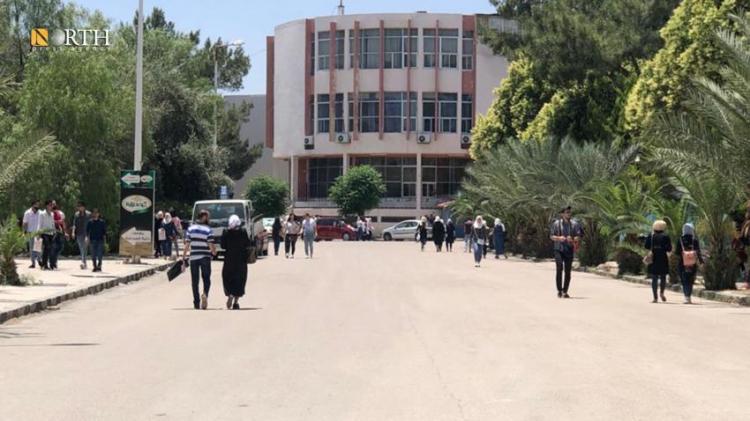DAMASCUS, Syria (North Press) – The Syrian Ministry of Higher Education announced the raising of university fees again starting from the next academic year, sparking widespread resentment among students as public universities continued to impose exorbitant fees on the decisions and documents issued by them.
On 28 May, Syrian President Bashar Assad issued Decree No. 125 for the year 2020, which allows undergraduate students who were previously barred from registration the opportunity to register again in their colleges and get an exceptional year for remediation, specialization, and masters studies students who were on academic probation. These students can now apply for exams from outside the university, and there is an additional year for MA and PhD students enrolled in the thesis stage before 1-3-2019.
Assistant Minister of Higher Education Riyad Tayfour revealed an expected rise in university fees starting from the next academic year, sparking anger among students.
Although thousands of students were satisfied with the decree, it caused those who wanted to return to their studies the problem of paying hundreds of thousands in fees, which exceed the past year’s fees of some private universities’ branches. Many students doubt the guarantee of free education.
"The Ministry of Higher Education is looking forward to making university education remunerated. It has already imposed tens of thousands in fees on students who struggle under difficult circumstances to complete their university studies," said Suha al-Jasim, a student at the Faculty of Sharia at Damascus University.
Widad Abdelmoneim, an employee in the Student Affairs Department at the University of Damascus, told North Press: "Tens of thousands of Students who have benefited or will benefit from the decree terms must pay 400,000 Syrian pounds for medical colleges if they entered the university according to the paid public education acceptance sheet (a sheet which shows the departments which one can be accepted to according to his/her grades), and 200,000 Syrian pounds if they entered according to the free public education acceptance sheet.”
She added: "Engineering and Fine Arts students must pay 300,000 Syrian pounds if they are accepted according to the paid public education acceptance sheet and 150,000 if they are accepted according to the free public education acceptance sheet. Agricultural Engineering students and Veterinary Medicine students accepted according to the paid public education acceptance sheet must pay 200,000, and 100,000 according to the free public education acceptance sheet."
The law and political science schools’ fees have reached 160,000 for paid public education, and 80,000 for free public education. The fees of the arts and Sharia colleges, technical tourism, and hospitality institutes, the Technical Applied Sciences Institute, and the Archeology and Museums Institute are 120,000 for paid public education and 60,000 for free public education, according to Abdelmoneim.
The student pays these fees not only at the academic probation stage, but also for the rest of university life, at a time when the public is witnessing an unprecedented economic and living crisis due to the collapse of the Syrian pound.
These fees come despite the fact that Syrian constitution states that education is a right guaranteed by the state, free in all its stages, and the law regulates cases where education is paid in universities and government institutes.
An economics teacher at Damascus University who preferred not to be named stated that "strategy of the Higher Education Ministry to make university education more expensive was not born today, but started with the receipt of Imad Khamis as a Prime Minister and the Atef al-Naddaf as a Minister of Higher Education."
He added: "In a meeting, Atef al-Naddaf emphasized that the Prime Minister literally instructed him to make the ministry an effective contribution to the state's general budget by raising university fees and granting broader powers to private universities, in addition to raising the fees for university documents, some of whose fees are now in foreign currency (the dollar)."
Lama al-Hussein, an English student at Damascus University, said that she decided to refrain from completing her studies due to the university high fees.
She added, "Free education is a lie. What ‘free’ are they talking about? These fees exceed that of a private university for a year or two."
About two years ago, the Ministry of Higher Education double registration fees for regular students. It also issued a decision in which students are required to pay fees of the paid public education throughout their college years in case they are put on academic probation or have a university punishment, in addition to increasing the Open Education fees (a type of education that accepts a large number of students regardless of their grades).
Damascus University issued decision No. 1129/9 last December, in which students and administrative crews who were subjected to university penalties were required to pay 100,000 Syrian pounds if they had a status settlement, which supported the university’s fund with tens of millions annually, according to a previous statement by the Director of Legal Affairs in the university presidency Nabil al-Miqdad.

